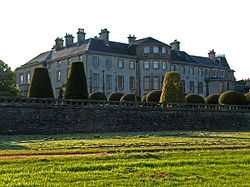Mahdi Al Tajir
| Mahdi Al Tajir | |
|---|---|
| Born | Bahrain |
| Residence | UK |
| Nationality | Emirati |
| Education | Preston Grammar School |
| Net worth | GBP £1.67 billion (STRL, April 2015)[1] |
| Children | 5 |
Mahdi Al Tajir (Arabic: مهدي التاجر) is an Emirati businessman based in the United Kingdom. Al Tajir spends much of his time at his London home or at Keir House, his 18,000-acre (73 km2) Perthshire estate. He has interests in finance and property, and owns the Highland Spring bottled water company.[2]
Al Tajir was named Scotland's richest man with wealth of £1.5 billion in the Sunday Times Rich List 2010.[2]
Life
Born in Bahrain, Al Tajir was educated at Preston Grammar School in Lancashire.[3] Al Tajir is married with five children.[4] Al Tajir's son, Maher al-Tajir, was found guilty of assaulting his girlfriend at Keir House in 2009.[5]
Al Tajir's 15,000 acre Blackwood estate in Perthshire, Scotland is owned by his company Park Tower Holding Establishment, based in the tax haven of Liechtenstein.[6] Al Tajir also owns London's Sheraton Park Tower Hotel at 101 Knightsbridge near Hyde Park[3] and Mereworth Castle in Kent, which he purchased in 1976 for $1.2 million.[7]

In the 1980s, he attempted to broker a peace deal in the Lebanese Civil War with his business partner Hani Salaam.[3]
Al Tajir has an extensive collection of silver artifacts and carpets. In 1993 Al Tajir paid the record price for a piece of silver at auction, when he bought a 1736 silver chandelier made by Balthasar Friedrich Behrens for £2.27 million at Christie's in Monaco.[8] Al Tajir formed a joint venture with Bonhams fine art auction house to open an office in Dubai.[3]
Business career
Appointed head of customs in Dubai by Sheikh Rashid bin Saeed Al Maktoum, he became one of Sheikh Rashid's most trusted advisors and was made the first Ambassador of the United Arab Emirates to the United Kingdom when the UAE was founded in 1971.[3] Under a thinly disguised name, Al Tajir's exploits as a negotiator were recorded in the 1976 novel Dubai by Robin Moore.[3] In 1963 Al Tajir became director of Sheikh Rashid's Petroleum affairs and effectively the most powerful man in Dubai after Sheikh Rashid himself. Al Tajir lost or resigned his position in 1981 with the downfall of Sheikh Rashid's health and the waning of his personal power, with the ascedency of Shekih Rashid's sons. Al Tajir remained UAE ambassador to the United Kingdom until 1987.
In London in the late 1960s, the Egyptian businessman Mohamed Al-Fayed was introduced to Al Tajir by Salim Abu Alwan, an Iraqi businessman.[9][10] Al Tajir informed Al-Fayed that Dubai was penniless and needed to borrow £1 million for the future construction of modern harbour facilities.[11] Al-Fayed secured a loan of £9 million from Imre Rochlitz, an American lawyer. Rochlitz's Jewish ancestry caused embarrassment to Al Tajir, and later caused Rochlitz to reject Al-Fayed's offer of a formal partnership.[12] Al-Fayed earned £1.5 million commission from the contract for British engineering company Costain to carry out the improvement works to the port. Al-Fayed also assisted with securing the financing for the Dubai World Trade Centre.[13] By the mid 1970s Costain had gained over £280 million of contracts thanks to Al-Fayed and Al Tajir.[14] Al Tajir's influence in Dubai was waning by 1977, and Al-Fayed was excluded from the commission process for a new aluminium smelter, and the development of Jebel Ali, putting Costain's future profits at risk.[15] In 1993 Al-Fayed was visited at his department store Harrods by Mohammed Alabbar, the director of Dubai's Department of Economic Development.[16] Alabbar had been appointed by Sheikh Maktoum to eradicate the system of large commission payments from previous decades. Al Tajir was challenged in the British courts to repay his alleged excessive profits earned from the construction of Dubai's aluminum smelter, and Al-Fayed was targeted over his management contract of the Dubai World Trade Centre.
The construction of Dubai's aluminium smelter caused Al Tajir to fall out with Sheikh Rashid’s sons.[3] In the judgement of a British court case, Al Tajir conspired to defraud Dubai Aluminium of millions of dollars in connivance with commodities trader Marc Rich, who owned a neighbouring property in Switzerland.[3]
Al Tajir owns a glass-bottling company in Dubai and a private bank in the tax haven of the Cayman Islands.[3]
References
- ↑ "Sunday Times Rich List". The Sunday Times (page 27). 26 April 2014.
- ↑ 2.0 2.1 "Sunday Times Rich List 2010: Britain's richest see wealth rise by one third". The Daily Telegraph. 24 April 2010.
- ↑ 3.0 3.1 3.2 3.3 3.4 3.5 3.6 3.7 3.8 "The World's Richest Arabs". CNBC. June 2007.
- ↑ "The World's Billionaires - #1062 Mahdi Al Tajir". Forbes. 2008.
- ↑ "arab-businessman-ordered-to-pay-500-to-girlfriend-over-assault". The Daily Record (Scotland). 27 October 2009.
- ↑ "Who are the lairds lording over us?". New Statesman. 13 December 1999.
- ↑ Monday, Aug. 02, 1976 (1976-08-02). "BRITAIN: Dinner for 370,000, Please, James". TIME. Retrieved 2012-02-16.
- ↑ Alberge, Dalya (7 December 1993). "Prints fraud led by grandmother". The Independent (London).
- ↑ Bower, Tom (1998). Fayed: The Unauthorized Biography. Macmillan. p. 43. ISBN 978-0-333-74554-0.
- ↑ Bower 1998, p.27.
- ↑ Bower 1998, p.31.
- ↑ Bower 1998, p.33.
- ↑ Bower 1998, p.36.
- ↑ Bower 1998, p.50.
- ↑ Bower 1998, p.71.
- ↑ Bower 1998, p.302.